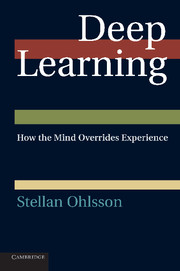
-
Select format
-
- Publisher:
- Cambridge University Press
- Publication date:
- 25 January 2011
- 31 January 2011
- ISBN:
- 9780511780295
- 9780521835688
- 9781107661363
- Dimensions:
- (228 x 152 mm)
- Weight & Pages:
- 0.84kg, 540 Pages
- Dimensions:
- (229 x 152 mm)
- Weight & Pages:
- 0.71kg, 540 Pages
- Subjects:
- Life Sciences, Cognitive Psychology, Psychology, Cognition
You may already have access via personal or institutional login- Subjects:
- Life Sciences, Cognitive Psychology, Psychology, Cognition
Book description
Although the ability to retain, process, and project prior experience onto future situations is indispensable, the human mind also possesses the ability to override experience and adapt to changing circumstances. Cognitive scientist Stellan Ohlsson analyzes three types of deep, non-monotonic cognitive change: creative insight, adaptation of cognitive skills by learning from errors, and conversion from one belief to another, incompatible belief. For each topic, Ohlsson summarizes past research, re-formulates the relevant research questions, and proposes information-processing mechanisms that answer those questions. The three theories are based on the principles of redistribution of activation, specialization of practical knowledge, and re-subsumption of declarative information. Ohlsson develops the implications of those mechanisms by scaling their effects with respect to time, complexity, and social interaction. The book ends with a unified theory of non-monotonic cognitive change that captures the abstract properties that the three types of change share.
Reviews
“The mind's ability to change is at the centre of everything distinctively human. Ohlsson deals with three central kinds of cognitive change: creativity, acquiring new skills, and revising beliefs in the light of new information. He offers new, highly original theories of each, built on three cognitive mechanisms: redistribution of activation, specialization of practical knowledge, and re-subsumption of factual information. This would already be enough to make the book important but Ohlsson does one more thing: he welds the three theories together. The result is a single, unified theory of all three kinds of conceptual change. Thus he takes us a significant step closer to the dream of a single, unified theory of cognition as a whole. Essential reading for anyone interested in how minds change.”
– Andrew Brook, Carleton University
“This book describes a more sophisticated theory of the mental processes that support and cause cognitive change. These aspects of cognition (creativity, strategy change, and belief revision) will become important areas for cognitive science to explore and explain. Ohlsson's theories encourage us to examine the next metalevel of how cognition changes, and the proposed mechanisms will provide many challenges for cognitive models and architectures.”
– Frank Ritter, The Pennsylvania State University
“Deep Learning inspired me to do some deep thinking about cognitive change, indeed, about the very nature of change itself. Ohlsson's description of cognitive change and the ability to override experience defines an essential aspect of what makes us human.”
– Gale M. Sinatra, University of Nevada, Las Vegas
"...This volume is must reading for cognitive psychologists interested in fundamental questions about the mind. It is the best and most important work in cognitive psychology I have read in a long time.... a field that sometimes focuses extensively on detailed models of minor phenomena, Ohlsson addresses some of the big questions that cognitive psychology promised to answer but hasn’t gotten around to. It should serve as an excellent starting point for discussions about cognitive change for years to come."
–Dr. David W. Carroll, University of Wisconsin-Superior, PsycCRITIQUES
"Deep Learning: How the Mind Overrides Experience is not only breathtaking in scope and intellectual in range, but also beautifully written and completely engaging.... Ohlsson's masterful book on Deep Learning should help put non-monotonic learning on the radar screen of cognitive psychologists as a central topic for further investigation and theory building.... Deep Learning is a book organized around one central hypothesis, but it is not a one-note book. The wealth of detail, the specific examples, and the precision in formulating his many ideas make this book an incredibly rich read."
–Carol L. Smith, Department of Psychology, University of Massachusetts at Boston, International History, Philosophy and Science Teaching Group Newsletter
"...This landmark book present theories of creativity, adaptation and conversion of belief culminating in elements of a unified theory, showing that we must override experience to understand how the mind works.... The book addresses continuous learning at multiple levels, from the micro-level of individual cognitive processing to the societal level of continuous learning and adaptation to change.... the book is seminal reading for doctoral students and researchers in cognitive psychology and for advance readers in disciplines such as education, decision science, artificial intelligence, and group dynamics....Deep Learning is a significant academic work explaining discontinuous processes that puzzle and challenge all of us.... The book is an erudite yet elegant and deep exposition of a new generation of cognitive learning theory and research.... This is a work of brilliant scholarship...."
–Manuel London, State University of New York at Stony Brook, American Journal of Psychology
Contents
Metrics
Altmetric attention score
Full text views
Full text views help Loading metrics...
Loading metrics...
* Views captured on Cambridge Core between #date#. This data will be updated every 24 hours.
Usage data cannot currently be displayed.
Accessibility standard: Unknown
Why this information is here
This section outlines the accessibility features of this content - including support for screen readers, full keyboard navigation and high-contrast display options. This may not be relevant for you.
Accessibility Information
Accessibility compliance for the PDF of this book is currently unknown and may be updated in the future.


